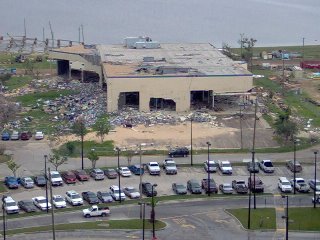At the end of any natural disaster, whether it is fire, or earthquake, tornado, or hurricane, the folks who own the property are those most invested in the solution. The clean-up comes down to whoever is left, whoever is available to haul away debris and begin the rebuilding. That isn't to say that government doesn't have a part of the solution, but the major work is done by the people left standing on the ground.
Let's say you own a business, a restaurant. It is a thriving concern, employing fifty people. It is on a bay that gets hit with a huge storm surge. After the storm, it looks like this:
 That building is worthless. Ruined. And it is your problem. You have insurance, no doubt, and the land that the building sits on has value. It is waterfront property, which always has value, but the value is diminished after the storm.
That building is worthless. Ruined. And it is your problem. You have insurance, no doubt, and the land that the building sits on has value. It is waterfront property, which always has value, but the value is diminished after the storm.As a property owner, you have a couple of choices. 1) Take the insurance money and rebuild. 2) Take the insurance money and cut your losses, sell the property at a residual value. Find something else to do for a living.
Does the government have a role in the rebuilding? Sure. Absolutely. The government has an interest in restoring infrastructure, getting power and water and roads back to normal. Rebuilding bridges so that commerce can commence. Local leadership has to restore the assets that allow the commerce to rebuild.
But the power to rebuild or not stays with the land owners. Property ownership is a powerful economic incentive to act in your own best interest. Even when a property owner decides to sell at a loss, the new owner has an economic interest in the property, and he picked it up for a song. The new owner buys a blighted property with full knowledge that it may be a year or two before the bridges are rebuilt, before the economy is restored. That all factors into the buy decision and the selling price of the property.
Initially, when the wind stops blowing and the rains quit, the guy with a bulldozer is the king of the economic jungle. He is in demand. Anyone who owns a bulldozer and backhoe is fully employed. He can set his own rates and pick his jobs. That guy's influence will diminish over time, as the debris is cleared away, and the people who know how to work concrete, or carpentery, or brick masonry will come into their own. They will be fully employed for a time, then the other industries will have their place in the sun.
The one thing the economy does not need is the welfare dependents. Those folks are a drain on a disaster economy. Government should be fully engaged in restoring services and infrastucture to the producing economy. The welfare drains, those without skills or knowledge or the willingness to work are not necessary to the vitality of rebuilding. They are better off in Atlanta, or Houston, or somewhere else that can provide for them.
No comments:
Post a Comment